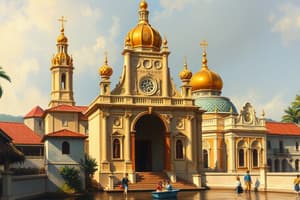Podcast
Questions and Answers
What is the purpose of a Novena in Filipino religious traditions?
What is the purpose of a Novena in Filipino religious traditions?
- To participate in colorful processions
- To pray daily for specific intentions over nine days (correct)
- To gather for a feast celebration
- To honor ancestral spirits
During the Lenten Season, what do Roman Catholics typically do in the Philippines?
During the Lenten Season, what do Roman Catholics typically do in the Philippines?
- Organize street parties
- Attend music concerts
- Celebrate a harvest festival
- Participate in Semanas Santa processions (correct)
What is the significance of Our Lady of Peñafrancia in Filipino religious practices?
What is the significance of Our Lady of Peñafrancia in Filipino religious practices?
- She is a saint with a chapel dedicated to her in Naga City (correct)
- She is the goddess of harvest
- She represents nature spirits
- She is the guardian of seafarers
What spiritual practices are performed by healers known as Hilots in the Philippines?
What spiritual practices are performed by healers known as Hilots in the Philippines?
In Filipino culture, what do communities do during Semanas Santa processions?
In Filipino culture, what do communities do during Semanas Santa processions?
What is the connection between Animist beliefs and the healing practices of Hilots?
What is the connection between Animist beliefs and the healing practices of Hilots?
What is a common Filipino practice related to successful harvests?
What is a common Filipino practice related to successful harvests?
What characterizes funerals in Filipino culture?
What characterizes funerals in Filipino culture?
What is a common feature of Filipino festivals?
What is a common feature of Filipino festivals?
What distinguishes Filipino family practices during birthdays?
What distinguishes Filipino family practices during birthdays?
What type of ceremonies are marked by historical milestones or honoring local patron saints in the Philippines?
What type of ceremonies are marked by historical milestones or honoring local patron saints in the Philippines?
Which aspect of Filipino customs offers valuable insight into its people's deep-rooted values and rich history?
Which aspect of Filipino customs offers valuable insight into its people's deep-rooted values and rich history?
Flashcards
Novena
Novena
A nine-day period of prayer for specific intentions, common in the Philippines.
Semana Santa
Semana Santa
The season of Lent where Roman Catholics commemorate Jesus Christ’s passion, death, and resurrection.
Hilots
Hilots
Traditional Filipino healers who use herbal medicines and ancient healing techniques.
Animism
Animism
Signup and view all the flashcards
Anitos
Anitos
Signup and view all the flashcards
Fiesta Food
Fiesta Food
Signup and view all the flashcards
Ati-Atihan Festival
Ati-Atihan Festival
Signup and view all the flashcards
Dinagyang Festival
Dinagyang Festival
Signup and view all the flashcards
Pahiyas Festival
Pahiyas Festival
Signup and view all the flashcards
Sinulog Festival
Sinulog Festival
Signup and view all the flashcards
MassKara Festival
MassKara Festival
Signup and view all the flashcards
Pamulinawen Festival
Pamulinawen Festival
Signup and view all the flashcards
Study Notes
Filipino Customs and Traditions
Steeped in history and heritage, the Philippines boasts a unique blend of cultures shaped by indigenous roots, Spanish colonialism, Chinese influences, and American occupation. This melting pot has resulted in vibrant rituals, customs, and traditions that continue to define Filipino identity. Let's explore several aspects of these beloved customs, starting with their strong ties to religion.
Religious Traditions
The predominantly Catholic nation weaves elements of Christianity into everyday life through various devotional practices like Novena, where communities gather daily over nine days to pray for specific intentions. Devotees also flock to churches during Lenten Season to participate in the highly anticipated Semanas Santa processions. During this time, Roman Catholics replicate Jesus Christ’s passion, death, and resurrection through colorful tableaus depicting biblical scenes. Additionally, one can find numerous chapels dedicated to various saints, most famously Our Lady of Peñafrancia in Naga City, Bicol Region, whose feast day is celebrated annually.
Cultural Ceremonies
One notable example of traditional spiritual practices is the ritual called Hilots. These healers utilize herbal medicines and perform ancient healing techniques without harming life, which aligns closely with Animist beliefs—a prehistoric ideology centered around ancestral spirits and respect for nature. In addition, many ethnic groups carry out rituals related to agriculture, such as planting rice and offering thanks to deities known as Anitos when harvests have been successful.
Family Practices
Family is the cornerstone of Filipino society, often acting as the focal point of Filipinos' lives. Birthdays are celebrated in grand fashion, typically featuring celebratory meals called fiesta food accompanied by singing karaoke songs. Funerals also represent significant events marked by elaborate wakes and burial rites steeped in tradition. For instance, families prepare special dishes made from favorite foods of departed loved ones during funeral banquets.
Fiestas and Festivals
Throughout the year, the islands host lively festivals showcasing each region's culture, music, dance, cuisine, and traditions. Some popular examples include Ati-Atihan Festival in Kalibo, Aklan; Dinagyang Festival held in Iloilo City; Pahiyas Festival in Lucban, Quezon Province; Sinulog Festival in Cebu City; MassKara Festival in Bacolod City; and Pamulinawen Festival in La Union, among others. Each festival marks historical milestones or honors local patron saints while highlighting distinct regional traits and differences, making them essential components of Filippine national pride.
In conclusion, exploring Filipino customs and traditions offers valuable insight into its people's deep-rooted values, rich history, and resilient spirit. From cherished religious practices and diverse cultural ceremonies down to intimate familial bonds and joyous festivities, every facet of these customs embodies the cherished Filippine ethos — embracing both the past and future with open hearts and open minds.
Studying That Suits You
Use AI to generate personalized quizzes and flashcards to suit your learning preferences.




